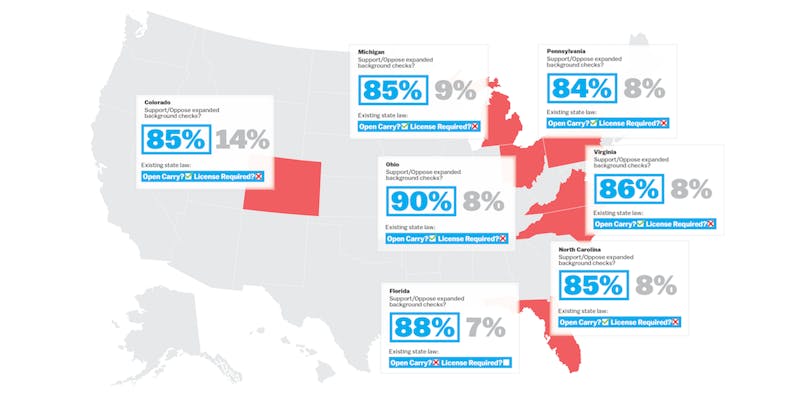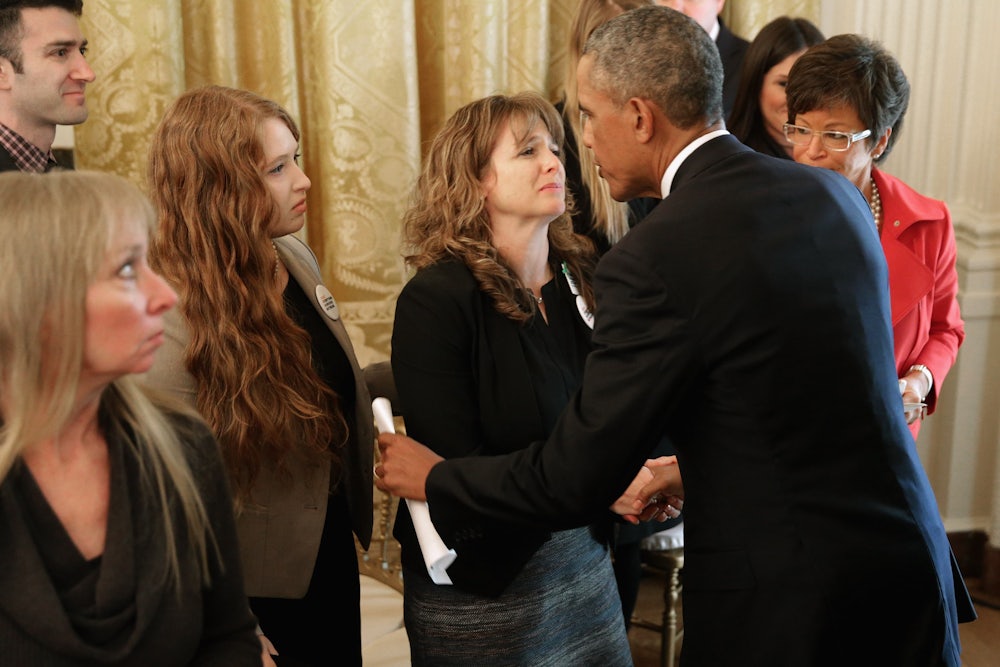Gun violence was always going to play a bigger role in 2016 than it has in any election in recent memory simply because of its sheer, in-your-face relevance: The nation can’t seem to go a week without a horrific shooting. But now that President Obama has taken action to bolster background checks and come out swinging against the National Rifle Association, joined by the leading Democratic presidential contenders, gun control has the potential to be the deciding issue of 2016. And it’s Democrats, for a change, who stand to benefit.
For two decades now, the conventional wisdom in Washington has been that any focus on gun control helps Republicans and hurts (if not dooms) Democrats, not just in presidential races but down the ballot in all but the bluest states. Fear of the wrath—and deep campaign coffers—of the NRA has led Democrats to make often-ridiculous displays of their love for hunting, and to avoid running on policy prescriptions for gun violence. This defensive stance first took hold after the 1994 midterms, when an assault-rifle ban pushed by President Bill Clinton was blamed for Republicans’ winning majorities in both houses of Congress. In 2000, Al Gore’s loss in his home state of Tennessee, which made Florida the pivotal state that cost him the presidency, was also attributed to his support for gun control. Noam Scheiber reported for the New Republic in 2001 that Gore’s team of advisers had worried that “gun control would hurt the vice president in the states he needed most,” particularly among rural voters in Pennsylvania, western Ohio, Michigan, Wisconsin, and Iowa. “After the election,” Scheiber wrote, “the Gore campaign’s hunch became Democratic gospel.”
President Obama treaded carefully on the issue in his first run for office in 2008, calling (with little detail or emphasis) for “common-sense reforms.” His position on guns, he often said on the campaign trail, was not “an excuse not to vote for me.” During his first term, the Democrats’ fear of the gun lobby still prevailed; after his first year, in fact, the Brady Center to Prevent Gun Violence gave Obama seven out of seven F’s on a report card for repeatedly failing to stand up to the gun lobby.
After he won re-election in 2012—with no more campaigns to run—Obama began to change his tune, a process that culminated in last week’s executive actions to broaden background checks and expand enforcement of gun laws. At a CNN town hall on gun violence that followed later in the week, Obama went after the gun lobby directly, calling out the NRA for skipping the event: “Since this is a main reason they exist, you’d think that they’d be prepared to have a debate with the president,” he said, archly. Later, he called the group’s views on gun confiscation a “conspiracy.”
By making such a forceful push on gun control right at the beginning of the election year, Obama has opened up new political (and rhetorical) space for the Democrats who are running this year to find their voices on gun control.
Frontrunner Hillary Clinton is clear she will take a forceful stance against the NRA and those who oppose any gun control. “What is wrong with us, that we cannot stand up to the NRA and the gun lobby, and the gun manufacturers they represent?” she said after an October shooting in Oregon. The shift in focus has made her leading contender Bernie Sanders more uncomfortable, with his spotty voter record trailing behind him. He’s much less forceful on the subject of the NRA, even if he hasn’t exactly been the group’s staunchest ally. “I have a D-minus , D-minus voting record from the NRA,” the Vermont senator said on MSNBC this week.
In October, Clinton released a plan detailing the executive actions and legislation she’d sign as president. She gained the upper hand in the last few weeks as gun-control groups like the Brady Campaign have endorsed her, crediting her for making “gun violence prevention a centerpiece of her campaign.”
Sanders was quick to back Obama’s executive actions last week as well. Like Clinton, he’s promised to support policies beyond expanded background checks. Clinton has released the more detailed plan, which includes banning assault weapons, blocking domestic abusers from accessing guns, criminalizing straw purchases, strengthening inspections of gun dealers, and repealing a law that shields gun manufacturers from lawsuits.
With weeks to go before the first primaries, Clinton has been drawing out the differences between her and Sanders’s voting record. Her focus this week has turned to a controversial 2005 vote in which Sanders backed an NRA bill to protect firearms manufacturers from lawsuits. Sanders has not reversed himself, only telling news outlets he considers Clinton’s attacks to be “mean-spirited” and “inaccurate.”
Sanders’s apostacies aside, the very fact that one of the hottest debates between the leading Democratic candidates is over which is the most consistent on gun control shows how much the politics of the issue have evolved.
Sanders’s chief strategist insists the candidates largely agree on most issues, and “going forward there are not big differences” between the Vermont senator and Clinton. And judging from Sanders’s more recent voting record on guns, that may very well be true.
But then we’re left with a question: Can the country elect a Democratic candidate who won’t run away from the gun lobby? The answer is yes. Democrats can not only survive a head-on battle with the NRA in 2016, but guns can help them win this election.
With or without Obama and Clinton’s embrace, the left was raring to fight the NRA in 2016. The rise of gun-control groups, including Michael Bloomberg’s Everytown for Gun Safety and former Representative Gabrielle Giffords’s Americans for Responsible Solutions will translate into millions more in pro-gun-control spending in battleground states. The NRA is gearing up for its own unprecedented campaign, too. The group’s legislative director, Chris Cox, said last fall the NRA wants to raise up to $75 million for the 2016 race, nearly doubling the $40 million it spent in 2008.
Democrats know they can win at least one argument: universal background checks, which are the core of both Clinton’s and Sanders’s proposals for better gun laws. As the graphic below shows, strong majorities in all the major 2016 swing states support universal background checks, according to Public Policy Polling.

The question is whether Democrats can move much beyond background checks and not risk losing the swing states—which are characterized by divides between rural voters, who tend to be wary of gun control, and urban voters, who want more restrictions on guns. Not all gun-control issues are equal in the electorate’s view, after all, and proposals like banning assault weapons would certainly prove more divisive than background checks.
But a variety of factors suggest that a Democrat can win the White House by going further—beyond defending Obama’s actions, and laws that were already on the books—to energize the party’s base.
Clinton or Sanders will have less to lose than ever in angering aging male, white, blue-collar voters over guns; a few of those voters might still register Democratic, but they haven’t voted that way in a long time, especially in national elections. What the Democrats need in 2016 is to rekindle the Obama coalition of more diverse, younger, urban voters, which make up the the growing base of the party—and these are the voters who tend to be open to gun-control arguments. According to Pew, for instance, 60 percent of urban voters are likely to support gun control more than the right to gun ownership, compared to 35 percent of rural voters. A majority of women support it as well (compared to less than half of men). In the same survey, 72 and 75 percent of African Americans and Hispanics offer general support for limits on guns.
The risk in campaigning on gun control, of course, is that it could galvanize the gun-rights crowd even more than gun-control supporters. The NRA’s base is a solid voting block, and a motivated one. According to Gallup, while 40 percent of anti-gun control voters would only support a candidate who shares their views, just 21 percent of pro-gun-control voters say they’d make their choices exclusively on the issue. But the NRA has shown diminishing returns in recent election cycles. Its affiliate groups spent $17 million in the 2012 election, but lost all six key Senate races the NRA targeted, including in the swing states of Ohio, Florida, Missouri, and Virginia. And, of course, the NRA’s chosen candidate lost the biggest race of them all, the presidential election.
Republicans, for their part, have something to lose in this election by their fealty to the NRA—those same voters among whom Democrats have been making steady gains, especially in the urban parts of swing states. Last fall, Obama began urging single-issue voting as the most effective counter to the NRA. “You have to make sure that anybody who you are voting for is on the right side of this issue,” he said. “And if they’re not, even if they’re great on other stuff, for a couple of election cycles you’ve got to vote against them, and let them know precisely why you’re voting against them. And you just have to, for a while, be a single-issue voter because that’s what is happening on the other side.”
If Democrats follow Obama’s lead and take the fight to the NRA, the 2016 election will represent a sea change on gun politics—the first time in many cycles that Democrats have even tried to channel anger against the gun lobby into votes. This election could finally put to rest the long-held notion that championing gun control sinks Democrats’ prospects.
